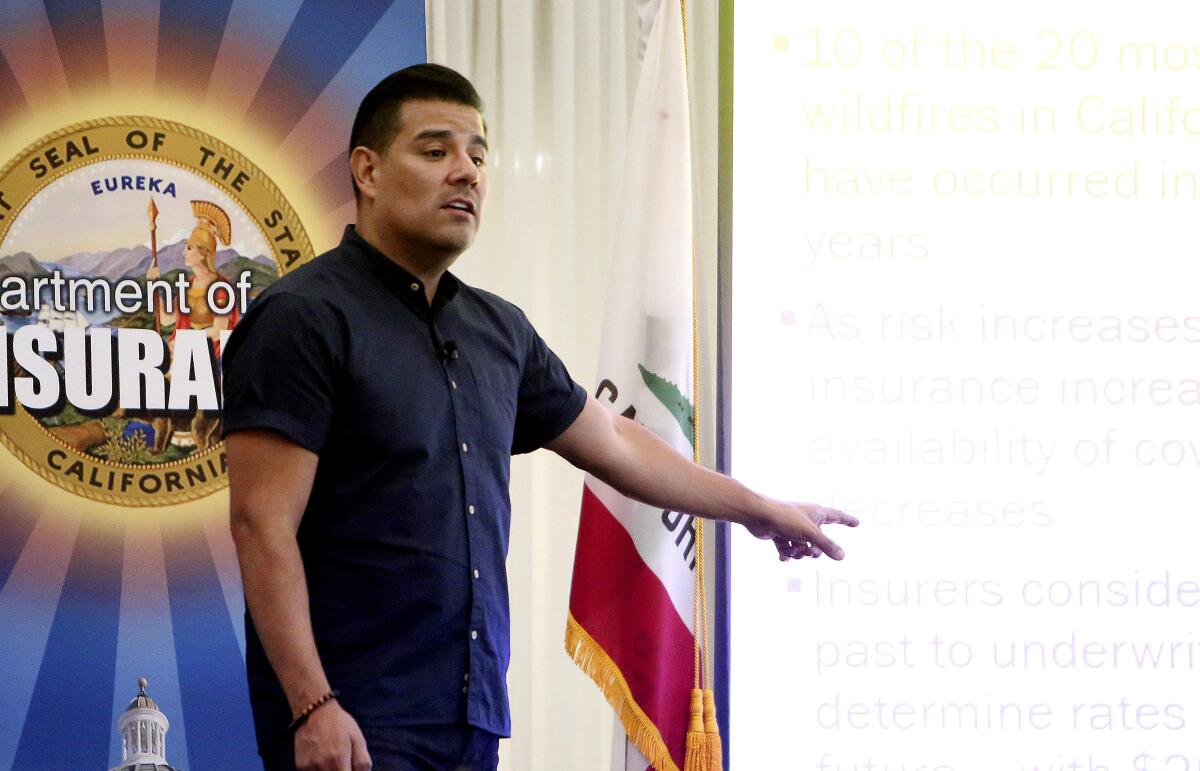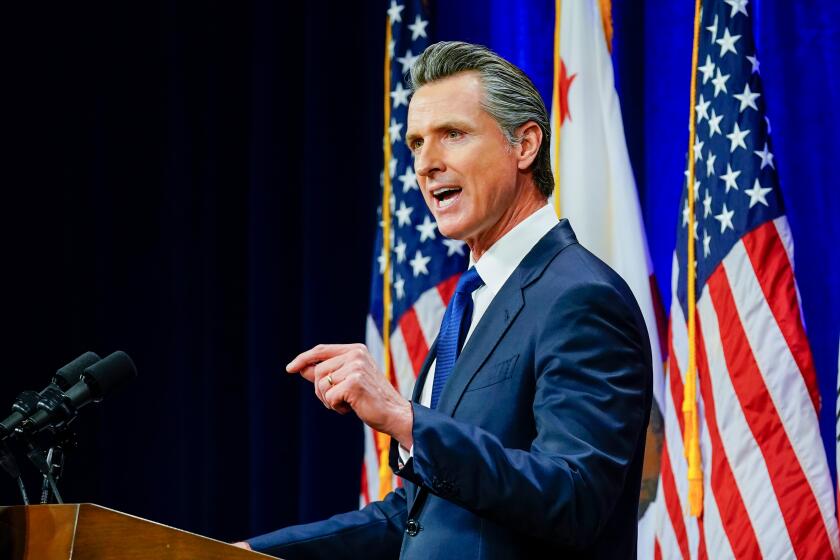Commentary: Three California races that might shake up the June primary

It’d be easy to think that Democrats’ dominance in California will make statewide elections this year a total snoozer. After all, the March 11 deadline for candidates to jump into the races came and went with few surprises.
Democratic incumbents’ lock on power was most evident at the top of the ticket, where Gov. Gavin Newsom and U.S. Sen. Alex Padilla will face little-known challengers who have yet to raise much money. Neither did significant challengers emerge in the races for lieutenant governor, secretary of state, treasurer or state schools superintendent — all offices held by Democrats. The power of incumbency, the enormous cost of running a campaign in this huge state and Republicans’ inability to win a statewide race in 16 years (even when the rules gave them an unfair advantage in last year’s recall) have combined to keep ambitious politicians away from contesting most statewide offices.
That’s frustrating because democracy works best when voters feel like they have real choices and politicians feel like they have to prove their value at each election. More than half of voters said in a recent poll that California is heading in the wrong direction, yet leadership across state government appears likely to remain in the status quo.
Mostly.
Newsom is seemingly on a clear path to reelection this November, four years after he was elected by the largest margin of any California governor over the past half-century.
Three statewide races this year will test Democrats’ hegemony and the relevance of California’s move to shake up the two-party system with an open primary. Each presents a different model of how politics are evolving to spur competition in what is functionally a one-party state:
The contest for the obscure office of insurance commissioner shows fractures in the Democratic establishment.
Democratic Assemblyman Marc Levine is challenging incumbent Democrat Ricardo Lara with a campaign blasting Lara for taking campaign donations from insurance company representatives, even though he said he would follow the tradition of his predecessors and steer clear of money from the industry he regulates. Lara returned the money in 2019.
He went on to win the endorsement of the California Democratic Party and will get significant campaign support from progressive advocacy groups that see value in his role as “America’s only LGBTQ+ person of color to hold statewide office.” But Levine is used to swimming upstream — he won his Assembly seat in 2012 by challenging a Democratic incumbent. And the divide here doesn’t fall neatly along ideological lines; Levine also has backing from progressives, including the California Nurses Assn. and the head of the progressive caucus of the California Democratic Party.
This contest will tap into Democratic identity politics as well as the very real insurance problems many Californians are dealing with as wildfires intensified by climate change become our new normal.
The biggest question in the primary is whether both of these Democrats will make it to the general election, because several other people are running, too. One who could shake up the race is Robert Molnar, a former Republican who is now registered with no party preference. He has worked closely for many years with former Insurance Commissioner Steve Poizner, who held the office from 2007 to 2011. Poizner, a wealthy tech entrepreneur, spent $1.6 million funding his own campaign for insurance commissioner in 2018 but ultimately lost to Lara. Molnar appears to be picking up Poizner’s torch as a centrist candidate arguing that the insurance commissioner shouldn’t be a partisan job.
After more than a decade near the back burner of voter concerns, fear of crime has risen to the fore as Republicans seize on the issue from the state Capitol to the White House.
The race for the powerful post of attorney general will test whether Californians have an appetite for nonpartisan candidates.
With polls showing Californians are increasingly concerned about crime, the race for the state’s top law enforcement official may be the most important and dynamic one on the ballot. Ann Marie Schubert, the Sacramento district attorney, is a former Republican who left the party in 2018 and re-registered without party preference, saying she has “views on both sides of the aisle.” A lesbian who has backing from major law enforcement groups, she’s challenging Democratic Atty. Gen. Rob Bonta, a progressive who emphasizes social justice. Bonta was appointed to the position by Newsom after the previous attorney general took a post in President Biden’s Cabinet. So he may be more vulnerable than most incumbents because this is his first time running statewide. Two prominent Republicans, Eric Early and Nathan Hochman, are also running.
This primary will test competing theories on California’s electorate: Will a nonpartisan candidate appeal to the growing share of voters who are not registered with either major party? Or do party labels amount to essential shorthand that help voters understand what candidates are all about?
The wide-open race for the controller’s office will reveal whether a Republican can gain traction in this deep blue state.
The controller is essentially the state’s bookkeeper, an important but not-at-all flashy job that involves maintaining the state payroll, auditing state operations and serving on boards that deal with taxes and finances. It’s attracted a large field of four potentially viable Democrats and one Republican in this election because it’s the only statewide office without an incumbent. (Controller Betty Yee is termed out.) Among the Democrats are Los Angeles City Controller Ron Galperin, state Sen. Steve Glazer, Malia Cohen, a member of the state Board of Equalization, and Monterey Park Mayor Yvonne Yiu.
Republican Lanhee Chen is making the case that the job demands an outsider who’s willing to scour the books and act as a check on Democrats’ management of state government. He has an impressive resume — degrees in law and political science from Harvard, stints as a policy advisor on the presidential campaigns of Mitt Romney and Marco Rubio, and a fellowship teaching public policy at Stanford — and has already raised $1.8 million. The son of Taiwanese immigrants, he also has a personal story that aligns more with today’s California than many Republican candidates do. Is that a package that can overcome the GOP’s terrible image among a majority of California voters?
We’ll find out this year whether any of these strategies to shake up the status quo will work. If they do, they could provide a road map for more competitive statewide races in 2026 and beyond — and that would be good for democracy in the Golden State.
— Laurel Rosenhall, a member of the editorial board
More to Read
A cure for the common opinion
Get thought-provoking perspectives with our weekly newsletter.
You may occasionally receive promotional content from the Los Angeles Times.













